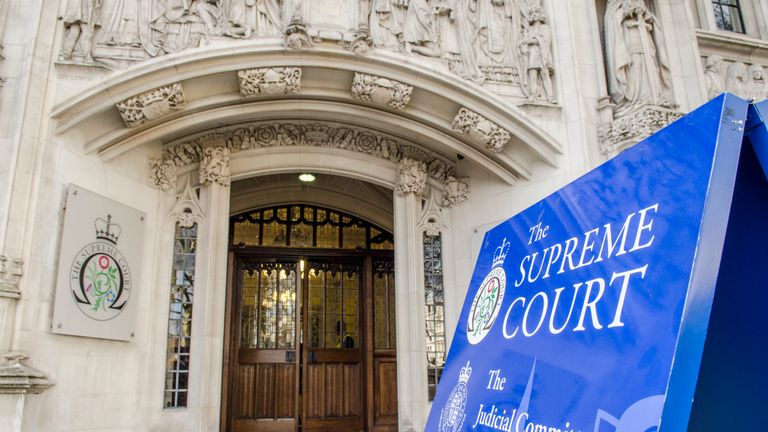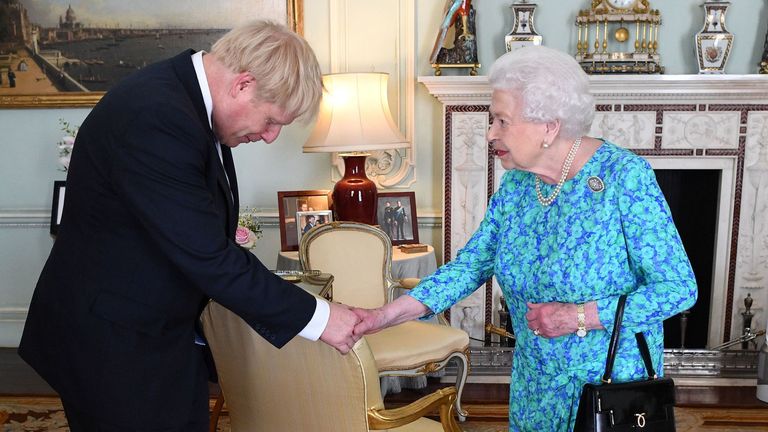The court battle over Boris Johnson’s suspension of parliament: What you need to know
Boris Johnson is bracing himself for the mother of all legal battles this coming week over his controversial decision to suspend parliament in the run up to Brexit.
Sky News takes a look at how we got here and what could happen next…
Why has the government been taken to court?
At the end of last month, the prime minister moved to suspend parliament ahead of the opening of a new session and the holding of a Queen’s Speech.
Usually, such a move is dull and uncontroversial, a box-ticking administrative procedure taken by the Queen on the advice of senior ministers.
Mr Johnson has insisted he simply wants to suspend parliament so he can set out his domestic agenda at the state opening of the next session.
But his opponents were immediately suspicious, given that MPs and peers cannot formally debate policy and legislation and scrutinise the government during this time.
Prorogation (the fancier term for suspension) is normally for a short amount of time, no longer than two weeks.
But the PM got the Queen to approve a suspension of five weeks, much longer than usual.
Opponents were furious.
They believed the aim was to stop them scrutinising Mr Johnson’s Brexit strategy and potentially prevent him taking Britain out of the EU on 31 October without a deal.
So they decided to fight it in the courts.
What have the courts decided?
A total of three legal challenges were launched.
The most noteworthy one – and the reason why the battle is moving to the Supreme Court – came in Scotland.
Three judges of the Inner House, the supreme civil court in Scotland, ruled the PM’s decision to suspend parliament was unlawful.
It came after the case, brought by a cross-party group of 70 MPs, was originally dismissed at the Court of Session.
Judge Lord Doherty said it was for politicians and not the courts to decide on the issue.
But the MPs appealed – and on Wednesday the Inner House delivered its bombshell ruling.
Three judges concluded that prorogation had been done with “the purpose of stymying parliament”.
The summary handed down said: “This was an egregious case of a clear failure to comply with generally accepted standards of behaviour of public authorities.”
It added there were two “principal reasons” for Mr Johnson closing parliament.
First to “prevent or impede parliament holding the executive to account and legislating with regard to Brexit”.
And second to “allow the executive to pursue a policy of a no-deal Brexit without further parliamentary interference”.
It said the suspension of parliament was “unlawful and is thus null and of no effect”.
A similar case was brought by the businesswoman and Brexit campaigner Gina Miller and was heard at the High Court in London.
The judicial review application, which was supported by a number of other parties, wanted the judges to find that prorogation for an “exceptional” length of time was an “unlawful abuse of power”.
But they rejected the challenge.
The third and final legal bid was launched by a Northern Ireland victims’ campaigner, who argued a no-deal Brexit would damage the peace process.
Raymond McCord’s challenge was dismissed by the High Court in Belfast on Wednesday.
Mr McCord, whose son was killed by loyalist paramilitaries in 1997, has vowed to appeal.
So what happens now?
Starting on Tuesday, the Supreme Court in London will hear the government’s appeal against the Scottish court decision.
A panel of nine justices will consider the case, with a ruling from the highest court in the land expected later in the week.
They are also expected to hear Ms Miller’s case, while the court may also consider the Belfast legal challenge.
The government has promised to respect the final result.
What happens if the government loses?
The PM would almost certainly have to advise the Queen to recall parliament immediately.
But the court could rule that parliament was never suspended and is still in session, meaning that there is no need to recall it.
Either way, it would be likely that parliament would have to return very quickly.
Raphael Hogarth, an associate at the Institute for Government, said: “If the Supreme Court rules next week that the prorogation was unlawful, then I’d expect parliament to be sitting again in very short order.
“The mechanics of that depend on what the court says.
“The court might say that parliament was never prorogued at all in the eyes of the law and so is actually still sitting after all.
“Or, the government might need to recall parliament immediately.”
Mr Johnson has rejected claims he lied to the Queen over the suspension, but a loss for the government would also likely spark calls for him to resign.
Whether the PM would bow to such pressure is up for debate – and it may depend on what exactly the Supreme Court says in its judgement on the case in the event the government loses.
What happens if the PM loses but he refuses to back down?
The Queen has the power to recall parliament through a proclamation, which Mr Johnson would be expected to advise her to do if the suspension is ruled to be unlawful by the Supreme Court.
If he does not, the monarch would be put in an incredibly awkward position.
The Queen is meant to be above politics, but such a turn of events would place her in the eye of an almighty political storm.
Source: Read Full Article




